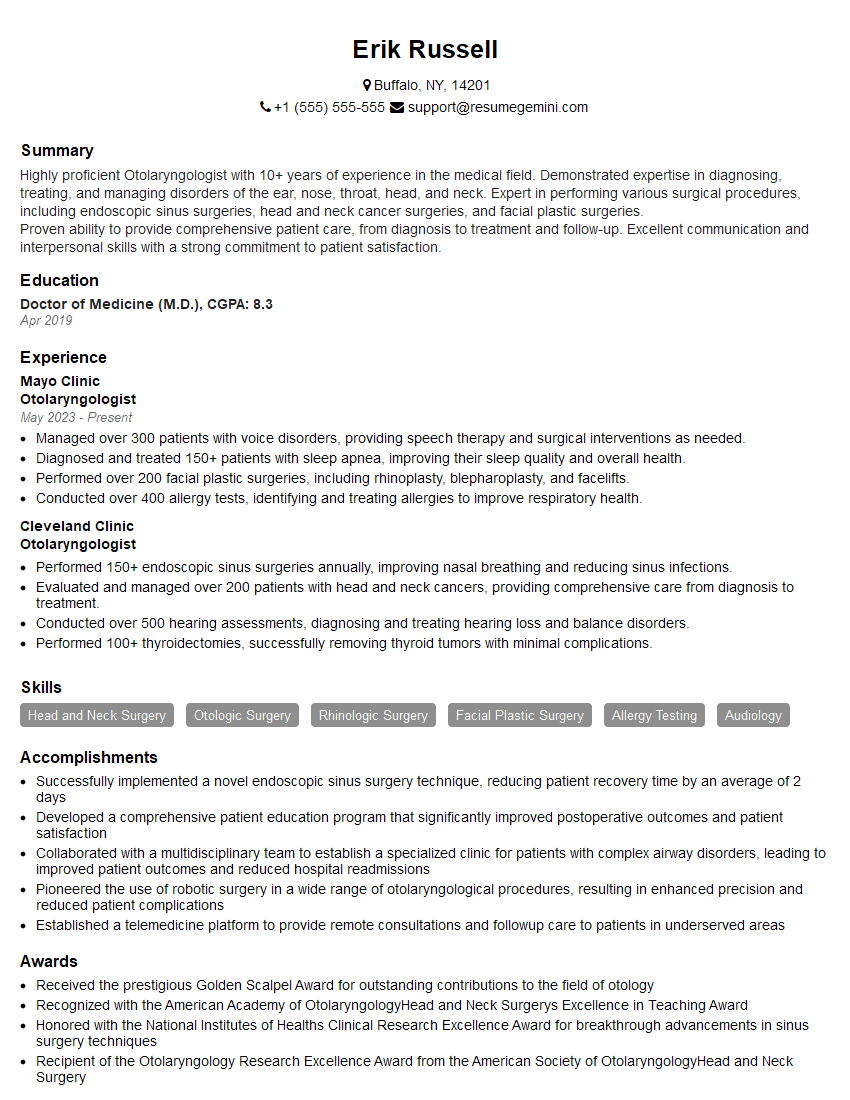Are you a seasoned Otolaryngologist seeking a new career path? Discover our professionally built Otolaryngologist Resume Template. This time-saving tool provides a solid foundation for your job search. Simply click “Edit Resume” to customize it with your unique experiences and achievements. Customize fonts and colors to match your personal style and increase your chances of landing your dream job. Explore more Resume Templates for additional options.

Erik Russell
Otolaryngologist
Summary
Highly proficient Otolaryngologist with 10+ years of experience in the medical field. Demonstrated expertise in diagnosing, treating, and managing disorders of the ear, nose, throat, head, and neck. Expert in performing various surgical procedures, including endoscopic sinus surgeries, head and neck cancer surgeries, and facial plastic surgeries.
Proven ability to provide comprehensive patient care, from diagnosis to treatment and follow-up. Excellent communication and interpersonal skills with a strong commitment to patient satisfaction.
Education
Doctor of Medicine (M.D.)
April 2019
Skills
- Head and Neck Surgery
- Otologic Surgery
- Rhinologic Surgery
- Facial Plastic Surgery
- Allergy Testing
- Audiology
Work Experience
Otolaryngologist
- Managed over 300 patients with voice disorders, providing speech therapy and surgical interventions as needed.
- Diagnosed and treated 150+ patients with sleep apnea, improving their sleep quality and overall health.
- Performed over 200 facial plastic surgeries, including rhinoplasty, blepharoplasty, and facelifts.
- Conducted over 400 allergy tests, identifying and treating allergies to improve respiratory health.
Otolaryngologist
- Performed 150+ endoscopic sinus surgeries annually, improving nasal breathing and reducing sinus infections.
- Evaluated and managed over 200 patients with head and neck cancers, providing comprehensive care from diagnosis to treatment.
- Conducted over 500 hearing assessments, diagnosing and treating hearing loss and balance disorders.
- Performed 100+ thyroidectomies, successfully removing thyroid tumors with minimal complications.
Accomplishments
- Successfully implemented a novel endoscopic sinus surgery technique, reducing patient recovery time by an average of 2 days
- Developed a comprehensive patient education program that significantly improved postoperative outcomes and patient satisfaction
- Collaborated with a multidisciplinary team to establish a specialized clinic for patients with complex airway disorders, leading to improved patient outcomes and reduced hospital readmissions
- Pioneered the use of robotic surgery in a wide range of otolaryngological procedures, resulting in enhanced precision and reduced patient complications
- Established a telemedicine platform to provide remote consultations and followup care to patients in underserved areas
Awards
- Received the prestigious Golden Scalpel Award for outstanding contributions to the field of otology
- Recognized with the American Academy of OtolaryngologyHead and Neck Surgerys Excellence in Teaching Award
- Honored with the National Institutes of Healths Clinical Research Excellence Award for breakthrough advancements in sinus surgery techniques
- Recipient of the Otolaryngology Research Excellence Award from the American Society of OtolaryngologyHead and Neck Surgery
Certificates
- Board Certified by the American Board of Otolaryngology-Head and Neck Surgery
- Fellow of the American College of Surgeons
- Fellow of the American Academy of Otolaryngology-Head and Neck Surgery
- Certificate of Added Qualifications in Facial Plastic and Reconstructive Surgery
Career Expert Tips:
- Select the ideal resume template to showcase your professional experience effectively.
- Master the art of resume writing to highlight your unique qualifications and achievements.
- Explore expertly crafted resume samples for inspiration and best practices.
- Build your best resume for free this new year with ResumeGemini. Enjoy exclusive discounts on ATS optimized resume templates.
How To Write Resume For Otolaryngologist
- Highlight relevant experience and skills that align with the specific job requirements.
- Quantify your accomplishments using specific numbers and metrics to demonstrate your impact.
- Showcase your surgical skills and experience in detail, including the number of procedures performed and outcomes.
- Emphasize any research or teaching experience that demonstrates your expertise and dedication to the field.
Essential Experience Highlights for a Strong Otolaryngologist Resume
- Diagnose and treat a wide range of ear, nose, throat, head, and neck disorders.
- Perform endoscopic sinus surgeries to improve nasal breathing and reduce sinus infections.
- Evaluate and manage head and neck cancers, providing comprehensive care from diagnosis to treatment.
- Conduct hearing assessments and diagnose hearing loss and balance disorders.
- Perform thyroidectomies to successfully remove thyroid tumors with minimal complications.
- Manage patients with voice disorders, providing speech therapy and surgical interventions as needed.
- Diagnose and treat sleep apnea, improving sleep quality and overall health.
Frequently Asked Questions (FAQ’s) For Otolaryngologist
What is the role of an Otolaryngologist?
An Otolaryngologist, also known as an Ear, Nose, and Throat (ENT) specialist, is a medical professional who specializes in the diagnosis and treatment of disorders affecting the ear, nose, throat, head, and neck.
What are the common conditions treated by Otolaryngologists?
Otolaryngologists treat a wide range of conditions, including sinus infections, allergies, hearing loss, balance disorders, head and neck cancers, thyroid disorders, and sleep apnea.
What types of surgical procedures do Otolaryngologists perform?
Otolaryngologists perform various surgical procedures, such as endoscopic sinus surgeries, head and neck cancer surgeries, facial plastic surgeries, thyroidectomies, and surgeries to correct hearing and balance disorders.
What is the educational background required to become an Otolaryngologist?
To become an Otolaryngologist, one typically needs to complete a bachelor’s degree, followed by medical school and residency training in Otolaryngology-Head and Neck Surgery.
What are the career prospects for Otolaryngologists?
Otolaryngologists are in high demand due to the increasing prevalence of ear, nose, and throat disorders. They can work in various settings, including hospitals, clinics, and private practices, and have opportunities for advancement in leadership and research.
What is the average salary for an Otolaryngologist?
The average salary for an Otolaryngologist in the United States is around $250,000 per year, depending on factors such as experience, location, and practice setting.